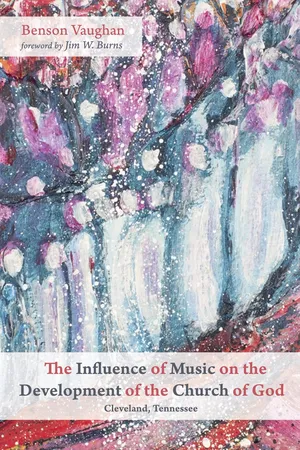
The Influence of Music on the Development of the Church of God (Cleveland, Tennessee)
- 306 pages
- English
- ePUB (mobile friendly)
- Available on iOS & Android
The Influence of Music on the Development of the Church of God (Cleveland, Tennessee)
About This Book
This book examines the influence of music on the development of the Church of God (Cleveland, Tennessee). This narrative is historically driven, but relies upon an interdisciplinary approach to draw on the insights of ecclesiology, theology, liturgiology, church development, and especially music. This study utilizes a chronological and systematic approach to the relationship between music and the Church of God in the United States during the first 125 years of the denomination's history, from 1886 to 2011. For over a century, music has been an often-neglected dialogue partner at the table of academic discussion and this research argues for recognition and a proper place in Pentecostal history. Along with primary and secondary sources, the important element of "living archives" is investigated in this work; these are interviews with people who participated in historical music events in the Church of God. The book also relies upon musical examples to explore the influence of music upon the shaping of the denomination's history and theology.
Frequently asked questions
Information
Musicology—A Study of Music History
Table of contents
- Title Page
- Foreword
- Preface
- Acknowledgments
- Abbreviations
- Introduction—The Gift of Music
- Chapter 1: Musicology—A Study of Music History
- Chapter 2: Etude—Mastering Difficulties
- Chapter 3: Composition—A Created Work
- Chapter 4: Ostinato—A Persistent Theme
- Chapter 5: Transition—A Key Change
- Chapter 6: Legato—Smooth and Connected
- Chapter 7: Sonata Form—Exposition, Development, and Recapitulation
- Chapter 8: Appassionato—Impassioned
- Bibliography